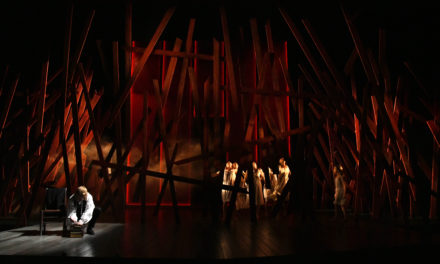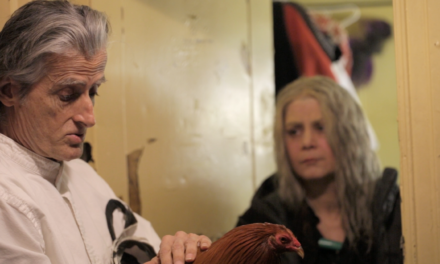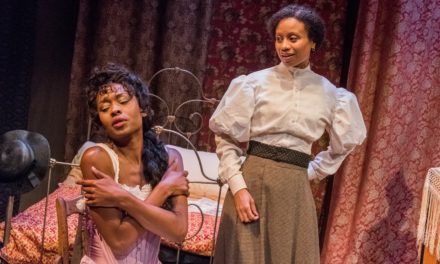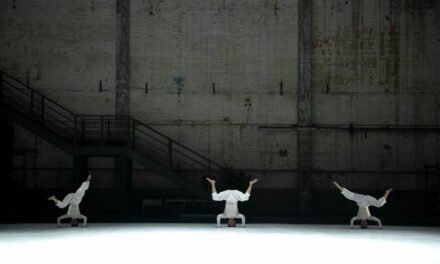Inclusion has quickly become the commanding narrative in the theater world, but when it comes to disability, not all of that inclusion is productive. Theater Breaking Through Barriers (TBTB), an off-Broadway theater dedicated to including and involving disabled people in all aspects of theater in order to foster true equality, has been working to change this for 41 seasons. Madison Parrotta sat down with Nick Viselli, the artistic director of TBTB, to learn more about their mission and to find out how disability can foster true intersectionality beyond activism in theater.
Madison Parrotta: How can disabled art and non-disabled art be merged as to not create a divide?
Nick Viselli: It’s a really interesting question and I have to open it and preface it by saying first of all art is absolutely welcome absolutely valid and absolutely important. There is a difference between disabled art by performers with disabilities or art by disabled artists and I think that if we’re only looking at that as a binary, they’re both really valid and very very important.
I think disabled art sort of exists on its own, it has its own niche, it has its own genre, and it can encompass a great deal. A lot of it tends to revolve around the disability and the expression of the artist within the confines of the disability. That is how I see it. I could be completely wrong about that, that’s just sort of my general observation. And then you have what we do, which is art by performers with disabilities.
Our goal as a company, Theater Breaking Through Barriers, is to alter the misperceptions surrounding disability in our world. There is an element of disabled art being a very important part of that because not only is it a valid aesthetic expression of the artist, but it exists within that realm of disability.
I want our artists to be recognized as artists first, not disabled artists first. That to me is the big difference. I think there’s a great misperception in our world, there’s many misperceptions surrounding disability. It’s been sort of hardwired into us forever. When you think of disability you think of someone who is not able to perform as a “normal person” would perform. And there’s a great feeling of sympathy and a lot of other fear, you know a lot of different negative feelings that are interspersed with that. I think it’s wrong.
If the goal here is to make it very clear that disability is just a human characteristic, whether you’re born with it or whether you become disabled at some point in your life it does not diminish the quality or the importance of the person and what they bring to the table as an artist, as an intellect, as you know as a human. Your experience is just as important and valid as all humans and that to me is what makes the big difference. So how do we do that how do we do that?
Well we can talk about it, we can do a lot of activism, and certainly disabled art helps, but I feel that our experience as a theater company is we want to focus on the art first. Why, because we feel that if we’re focusing on the disability then we are perpetuating the misperceptions of disability.
We are very fortunate to New York City and there are so many niche theatre companies and organizations that do this particular style of theater: I only do Jacobean drama, I only do Shakespeare, I only do restoration comedies, or I only do work that is really is about the African American experience or the Puerto Rican experience or the LGBTQ experience. And while the mainstream society can see all of the niche companies as being professional, when they hear disabled theater companies they automatically just go to “How can it be professional if you’re disabled?” like there’s a contradiction there and a disabled person can’t do what a “non-disabled” or “normal person” can do. To me that is a misperception. That’s where that becomes a point of attack for us. I feel that’s where we can really get in and change the perception not to hide disability.
I don’t want that to be the lead, I want it to be the art that is the lead. We have to, as a theatre company, compete in the off-Broadway mainstream arena. There’s a lot of things I’d like to do with the company; I would love to do more education, I’d love to be able to work with artists who want to act and train and develop and ultimately bring people to a level where they can become part of the off-Broadway and beyond—show them off.
I think our world is in a point where we’re very self-aware with all of the talks of diversity, equity, and inclusion over the last several years. Especially I think people are much more aware of the fact that we have to be more mindful and respectful of diversity. But this is the bigger picture to me. I think that in all of the discussions I have had, I’ve been to—in panels I’ve sat in on, in the round table discussions I’ve had surrounding diversity, we always focus on the diversity and we’re not focusing on the fundamental fact, which is we’re all the same.
If I can’t acknowledge the similarities in each of us before I address the differences, then the differences don’t matter. I need to know that you and I are the same. You are just like me in the sense that you have the same needs that I have. You need food and you need shelter and you need love and you need to express that; you need to do this. Even the fact that we are so vastly different from each other is a similarity. If we don’t acknowledge that fundamental point then all we’re doing is talking about different groups and how are we going to connect? You’re never going to be like me. So what we just have to respect each other?
“I gotta make sure that when I do this show I make sure I cast an African American and I cast an LGBTQ, then I have to cast disabled people and check off the boxes.” Is that the way we do it? That’s not how you make art! You make art by finding the best people, the best artists. I feel in our case there are too many incredibly gifted disabled artists out there that don’t get the attention because people only see the disability.
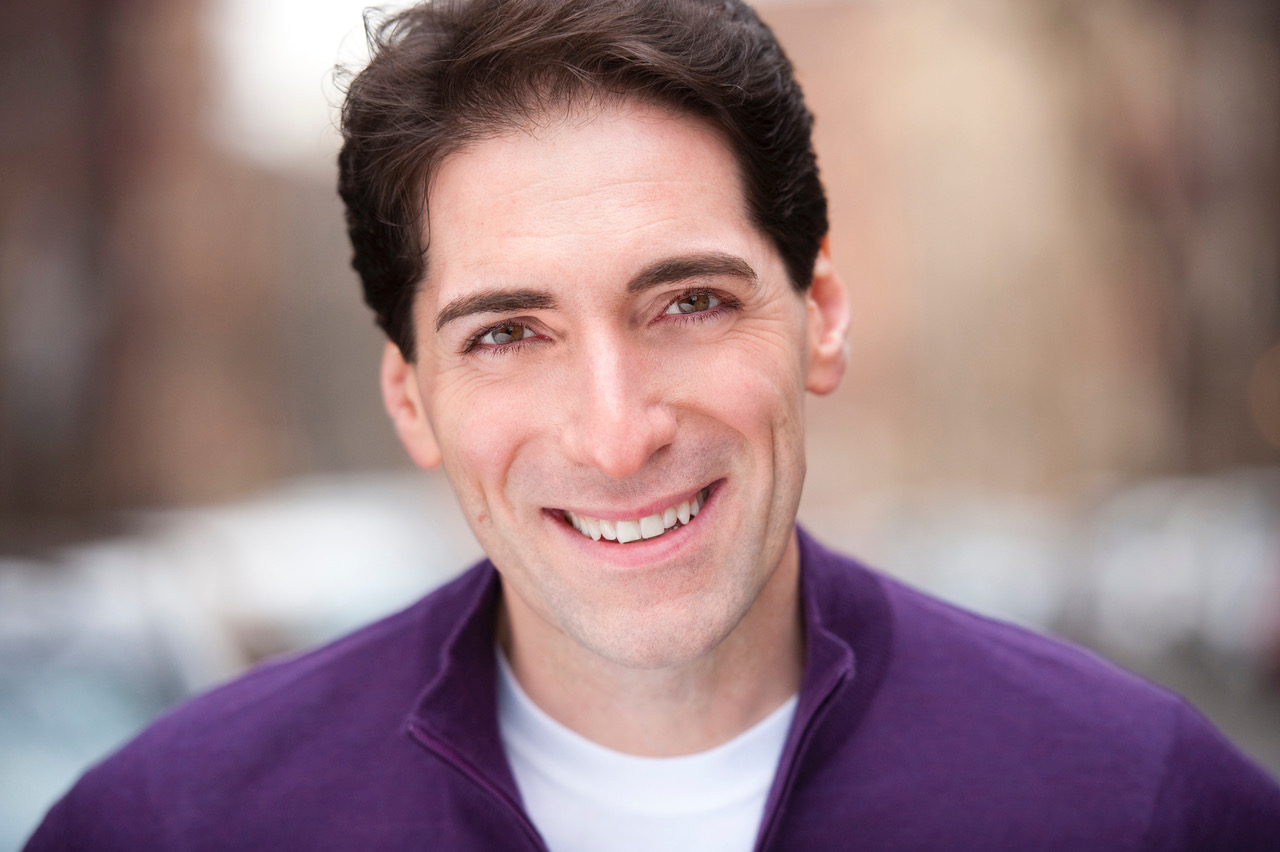
Nick Viselli, artistic director of Theater Breaking Through Barriers | Photo Credits Taylor Hooper
MP: How can disabled artists of all forms put their art before their disability, especially when they are so often overlooked?
NV: It’s a hard question. I don’t want to make this sound like a trite answer, but choosing in your life to be an artist whether you’re disabled or not is an incredibly difficult profession. Because as an artist you just want to create whatever it is you create, whether it’s a writer or painter or a sculptor or an actor, you want to create. And part of that, which is the part that most people or that most artists overlook, is it is a business as well and if you want to get noticed you have to sell yourself. You have to learn how to be a business person.
Now a person with a disability has the added burden, truthfully, of having to break through that stigma because people see disability, and right away the answer is “No, sorry. Lovely that you want to do this but no.” And that’s a hard one. So how do we re-educate the public to get people to realize “No, you’re looking at a disability, you’re not looking at an artist.”
We talk a lot about casting people with disabilities and saying “Oh no no no, only disabled people should play disabled roles.” At this time, yes, I absolutely agree because there are so few disabled roles and to give them up to somebody who’s non-disabled is wrong. But ultimately, personally, I don’t care about that as long, and this is the big caveat, as long as if you’re going to cast a non-disabled person in a lead role then I would say great, then you have to cast a disabled person in a non-disabled role of equal value to that role. Give a non-disabled person a chance to play someone who’s disabled.
Actors love the challenge of playing something or someone that is removed from themselves and that goes both ways. So why not have a blind person as the head publisher who is disabled and have an author trying to get in and it is the publisher who is the disabled one who’s basically saying “You’re not going to get through the door, buddy, you’re disabled.” That to me makes it even richer. Then it becomes more, then it becomes art.
We create our worlds, in a book, and film, on canvas, we create the world, so we can make those worlds whatever we want them to be. And if we’re too stuck in “No it’s got to be real, people aren’t going to believe it,” that’s nonsense. People will believe what you tell them. People love stories and if you take them on a wild ride and say “Suddenly the sky opened up and a giant marshmallow came flying out,” that’s imagination, people love that stuff, we all love that stuff.
I guess the answer to the question is a person with a disability has to do the exact same things that a person who is not disabled has to do but it is a much harder climb.
MP: In what ways do you feel the theater landscape needs to change to fully include those with disabilities?
NV: There’s been some progress. I do think there is most definitely been progress, I think it’s wonderful that we’re starting to see more stage and film and television casting people really trying to include disability in the conversation.
I think still sadly, we’re at a point where it’s still I need to check the box. It’s more the idea of “Oh you have such a very different experience and let me into your world, you are in many ways an alien on this planet.” No, that’s not the point. Not that I want to trivialize disability, but it’s an argument where you see someone with a very unusual shade of colored eyes and you’re like “Oh my goodness tell me what it’s like to have such unique colored eyes. I mean what is it like for you? How does it feel to be you walking down the street and have everyone look at you and you’re really strangely colored eyes?”
Once again it’s the slowing down and being able to acknowledge the person that is opposite me. And when we’re talking about the myriad of disability in the world—some that are very visible and some that are absolutely transparent, you get to acknowledge that and to say “Alright well we have to build a society that tries to think through what does everyone need, how can we make this easier for everyone?”
Just simple things like, why do you need all these big aesthetic staircases? I have no problem with it, but there’s going to come a time when you’re not going to be able to use the stairs. Whether it’s the fact that I’m just really tired and I had a long day, or I pulled a muscle, or I have a disability, or I’m older now and my arthritis is flaring up. Why not create something that has easier access for people? Those are things that need to be built.
In the world of theater, it really is the acknowledgment of the artist that ultimately matters. We’re still in the token genre. I think Ali Stroker is incredibly talented and she absolutely 100% deserves the Tony award. But let’s not kid ourselves, giving Ali Stroker the Tony award also made a very big political statement for the Broadway community. And that says something too. We know how major award givers like to make statements in the way they present awards. And again, I want to be clear I think Ali absolutely deserved it, she’s so talented, but that’s where we have to get beyond.
I think it’s great that a show like Hamilton’s come out, I think it’s great that Joe Biden is now creating a cabinet full of diverse people, but I don’t see a disabled person on his cabinet. Not one disabled person on a cabinet, one person that will represent disability, I think that becomes important and that’s something that needs to be addressed. Yet once again, disability takes the backseat. It almost feels like disability is not a political issue. We have to be fair to people of color because you know there is systemic racism, right, but what about the systemic bias for people with disabilities who are living in a non-disabled world?
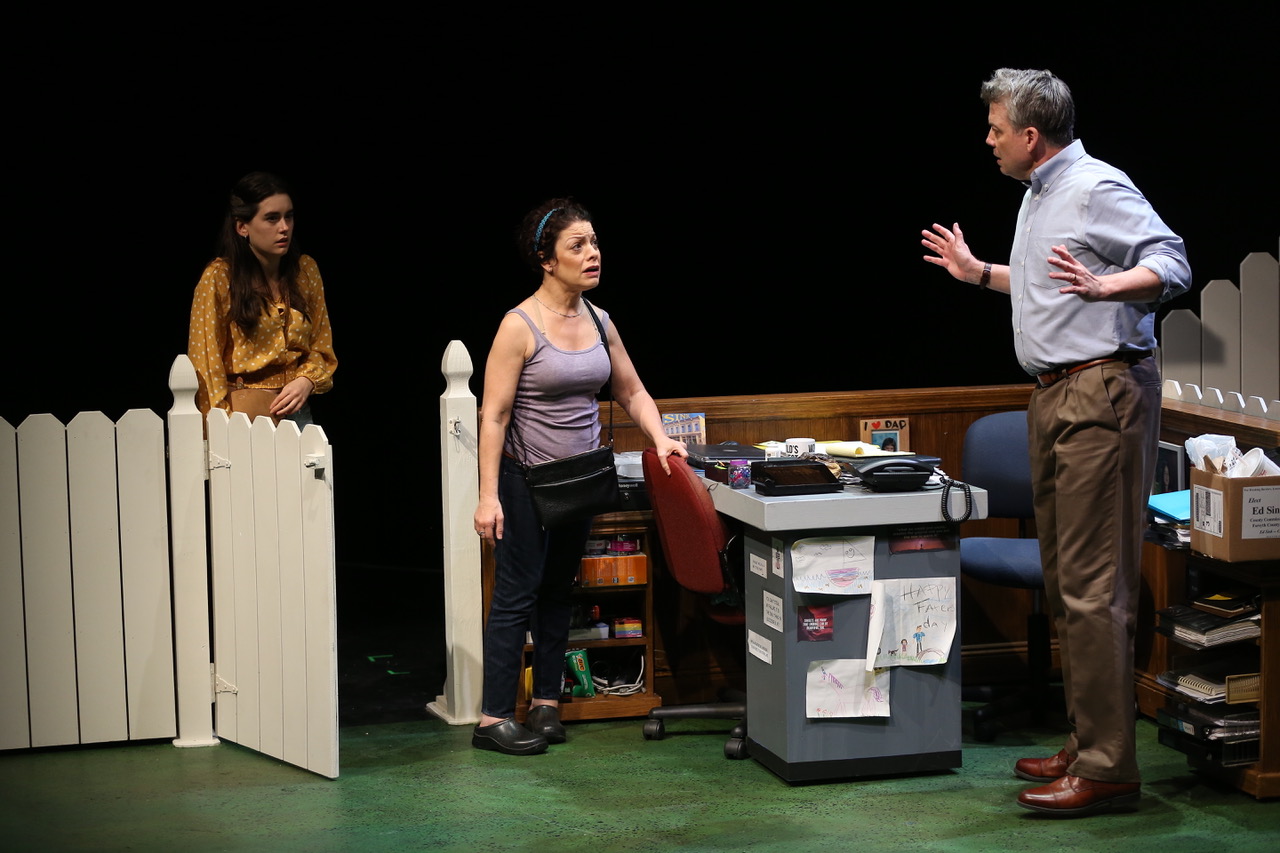
Public Servant by Bekah Brunstetter (2019) — Anna Lentz, Christine Bruno, Chris Henry Coffey | Photo Credits Carol Rosegg
MP: How do you embody TBTB’s mission now, and how do you hope to in the future?
NV: A mission is a living, breathing thing. I, as the artistic director, take it very seriously. The mission has grown and it has progressed in a big way. Our company has always been an integrated company, mixing disabled and non-disabled. That’s the way it was from the very beginning and I stick with that. I think it’s so important because making it an integrated company does allow us to focus on the art and not just the disability.
The goal for us is we want to create professional off-Broadway theater. The way we design our art is we try to do all of our problem-solving in the rehearsal room and in the lab. It’s really sort of addressing what everybody needs, disabled or not. What are your needs, what is going to help you achieve your aesthetic within this collaborative production? How do we achieve that, how do we give you what you need? That’s important. Sometimes we have to pay extra, those are costs but those costs are built into what we do. And sometimes we fail, we make mistakes, but the goal is to learn from those mistakes and keep trying.
The goal is to constantly try to provide work for all artists and performers, administrators, technicians, designers, writers, and people with disabilities. We don’t do enough work. We’re still a small company. We can only really do one or two productions a season, and if you want to be an off-Broadway company we have to choose that work very carefully. If we decide this season we’re going to put all our money on this new play that no one is going to come and see no matter how much we promote it, it can destroy us.
My goal is that we are able to build a season of three or four plays so that we can build a variety of seasons and we can every year showcase a new artist. Then it gives us an opportunity to say many different things in a season aside from just one or two things.
And people have said to me, your mission is creepy a little bit Nick, but I don’t think it is. First of all, we are in a very unique place with the disabled community because disability sits at the intersection of every other diversity. We’re the only diversity where that exists in every other. We sit at the hub of the wheel. Since we are at the hub of the wheel, we as a disabled community, are in a position of great opportunity. It’s also a position of great power, where we can be ambassadors and welcome everyone into the circle.
And now you may say well now you are distorting the mission, Nick, because you’re supposed to be working with disabled people. I would love to have disabled artists within all the different sections of our community. But I think it’s more important that each section realizes that we represent them as well. We speak to them and we speak for them because if we’re just speaking for the disabled community, we are limiting ourselves as just another niche as opposed to being taking advantage of the opportunity to say we can be the ones to reach out our hands and pull everyone in and say join us. It’s a we, it’s us.
If we now are able to create work that actively can represent all the different communities, now our message of disability also becomes a universal message. It’s not just about your race or your age or your gender or your religion, it is about a bigger picture. That to me is a much more significant point, which is why I’m trying to really expand. I want to bring in other artists, I want to bring in other disabled artists, and I want to bring in artists that have different perspectives from different areas. If our artists are going to be taking part in this collaboration, well then, we aren’t fulfilling our mission. But if we just decide to stay in our own yard, we can do that, we can play on our own.
We did this consult. We wanted to develop a really good strategic plan for how to move forward because we are now still currently faced with the same issues that we’ve always been faced with as a company, which is we’re an off-Broadway Theatre company trying to compete with other off-Broadway theater companies and we have a mission that is very specific about advancing and showcasing the work of artists and performers with disabilities.
When the mainstream public hears that they automatically are like “That’s very good, you’re doing wonderful work, God bless, I’m not particularly interested because I don’t think it’s going to be very good, but I think it’s important that you do it and God bless you for taking care of the disabled community.” And I don’t want to hear that, that’s nonsense. Because our work is just as good as any off-Broadway theater company and our artists are of that caliber, they’re just as good, if not better and they need to be seen. So how do we do that?
The consultancy basically said if you want to compete as an off-Broadway company, you’re not going to succeed. It was sort of this idea that they thought our strongest point of attack, would be focusing on much more advocacy. They said we should be more like an advocacy group that does theater and we can then corner the market on disabled theater.
My point is no! Because as long as we put disability over the banner, it’s not going to move the needle. As we talked about before, when it comes to disabled artists wanting to have a career, it’s a much steeper climb. That’s the same with us. The only way we can achieve that is in practice. We have to just constantly do great work.
MP: That’s the advocacy.
NV: That is the advocacy. By generating work that is just as good, pound for pound, as some of the bigger off-Broadway companies that you see at the Public or the Roundabout or the Signature or Playwrights Horizons, but with our mission and our artists. That’s the advocacy. And that’s how we make a difference, it’s just building that reputation of having artists or having an audience to say “I want to see this work because it’s good” not because “that’s a good cause.”
No, I don’t care about the good cause. Do you want to donate money? Absolutely. I’ll be happy to take your donation. But give us a donation because you liked the work because you believe in the work. That’s harder.
The Roundabout is doing a thing next year which is an online short play series and they want to focus on disability. We were not invited to be a part of this. This is part of the problem. I don’t know whether it’s the fact that I am a non-disabled artistic director or what, but a lot of times in the discussions of disability I’m not included as much anymore. I should be. Although I don’t know if people want to hear what I say because I’m not just toting the activism line. But I’m really more about the idea of I don’t want to talk, I want to do. I think that becomes more important for everybody. I think it’s more important for this company that we’re just constantly doing.
But they’re doing something and it’s a short play festival and the key companies that are involved in it are DreamStreet Theatre Company and Epic Players. I think that’s wonderful, but my perception of this is that’s Roundabout saying “Alright this is our way of recognizing disability, check that box.” It’ll make a great line on a grant proposal saying we did this whole thing to honor the disabled community. I could be wrong about that and I don’t want to throw mud at the Roundabout, but that’s sort of how it appears as opposed to saying the practical of we’re doing this whole play reading series with all these big stars and we’re going to include the disabled community in that reading series.
In Japan, they have been making a big deal about of course the Olympics and then the Paralympics. But I’m really bothered by that. It’s great that they have a Paralympic Games but why can’t it just be one big Olympics, why do they have to make it the consolation? The TV cameras tend to disappear after the Olympics and all the big world-class athletes go away and all the world-class disabled athletes who are every bit as good as the non-disabled athletes. They might get the ESPN 12 or something like that.
Why not make one giant Olympic Games that instead of being two weeks, make it four weeks and intersperse the Paralympic events in with the Olympic events so that the world gets to see all of the artists at once. I’m not saying that disabled athletes have to compete side by side with non-disabled athletes. I would love to see that, but I understand the differences. If you’re in a wheelchair and you’re running against someone who’s not, there’s an advantage or disadvantage, we can discuss that for days. But it’s the idea of really showcasing and giving disabled athletes the same platform, the same equal ground and then just calling it the Olympic Games and have all of the athletes competing within the same timeframe, with the same television coverage, and the same sponsorship. That would make it better.
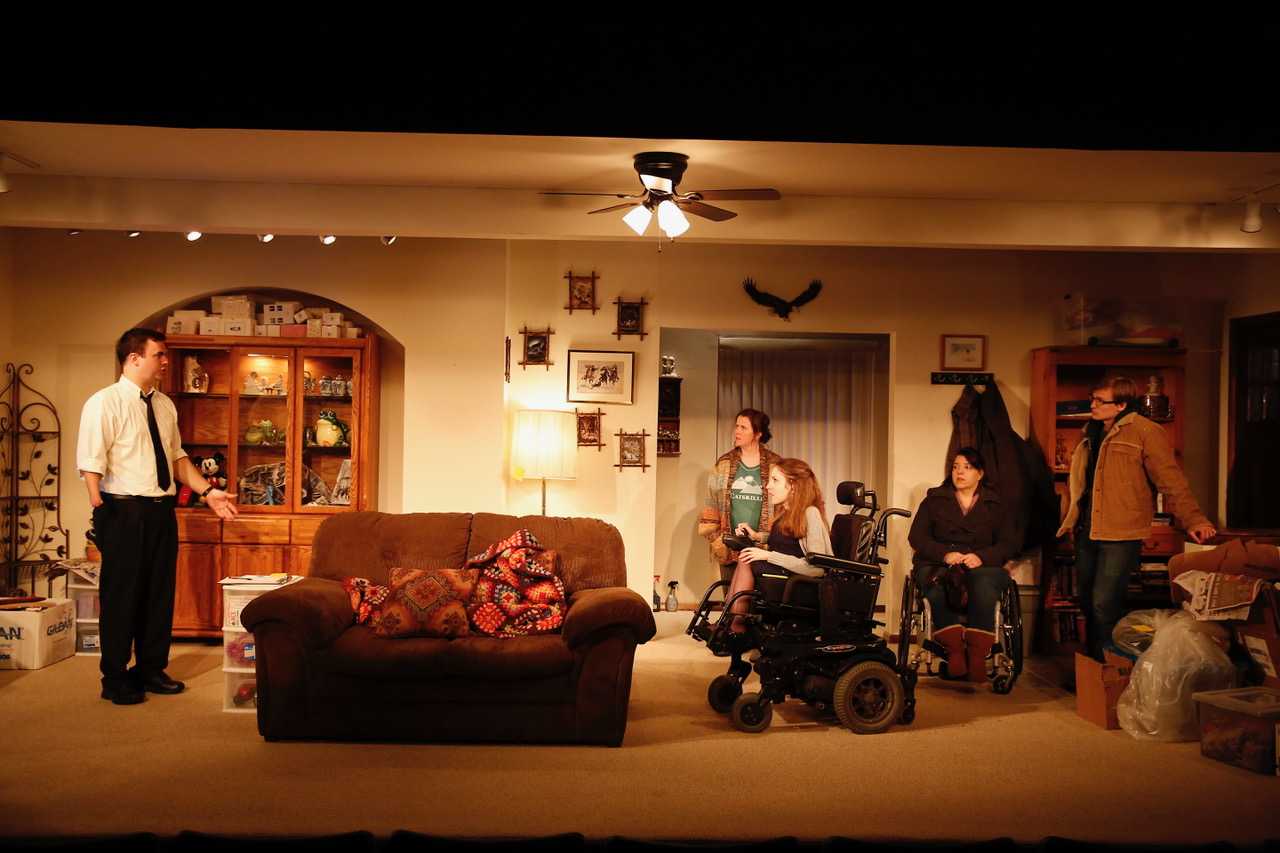
The Healing by Samuel D. Hunter (2016) – David Harrell, Shannon Devido, Mary Theresa Archbold, Jamie Petrone, John McGinty | Photo Credits Carol Rosegg
MP: How has the coronavirus negatively and positively affected the company and the work produced?
NV: Negatively of course it’s affected our entire world as a performing arts organization. It’s been devastating. We’re so used to creating a certain way and that is being in the room together and collaborating, sharing together, and then presenting to a live audience and that in-person exchange is what makes live theater so important.
That exchange between the artists on stage with the audience and the audience’s reactions and energy that feeds it all makes a very special experience. It changes every night depending on everything. It’s like wine, depending on the weather and the events in the world and whatever. There could be one person who is having a bad day and that’s what they’re projecting and it just sort of now changes the flavor of the entire soup. But that’s live theater, that’s what makes it so great, so we miss that.
But this pandemic has opened the door for this new opportunity that we would not have really paid much attention to. My initial thought was I like to use this opportunity to say, well, now the world is disabled, congratulations. If you want to know what it’s like to live as a disabled person now you’re getting a taste of that. Now you are now limited in what you can do, you can’t move about as freely as you did, you can’t do things as easily, you have to now come up with new ways to achieve a comparable level of what you were able to do prior to this. That to me is a valuable lesson.
People complaining about wearing a mask, really? It’s crazy. That just shows how consumed and spoiled we are, that we’re so much worried about me me me, my rights, my this, my that, instead of sort of projecting it outward and saying what’s the bigger picture here? Because we all affect each other. We all touch each other’s lives. When I’m walking down the street, I can be having a miserable day, and I could just pass a stranger on the street who just looks at me and smiles—don’t know them, never saw them and that smile can change everything. Suddenly it’s like “wow they acknowledged me” I don’t know who they were, but that that little lift just can change you. It’s so subtle. And yet we missed that because we’re so consumed by this. I think that’s an important thing to learn. We need to slow down a bit more.
It is my hope that at the end of all of this, we don’t go back to say “Thank god it’s over now we’re back to normal, back to business as usual.” There’s no way we can do that after a year of this, after all the sacrifices, after the economy, after the number of people who are sick and dying and it grows every day. To shrug all that off and say “OK thank God that’s past us now let’s go back to normal.” No! Now you need to reflect on what you learned.
As artists, that’s our job to remind people that this experience has been in many ways a gift and it has been a curse. Just like everything else in life, it is a double-edged sword. The curse is it has damaged us, yet the blessing is it’s opened our eyes to so many different things. I don’t want to just wake up and hit the snooze alarm and go back to sleep again and pretend that it didn’t happen.
MP: Who are a couple of your favorite disabled creatives and/or organizations?
NV: I have to be honest with you, when I’m focused on what I’m doing, I tend to keep my head down. As the artistic director, I should be always seeing new work and seeing art and seeing what other people are generating and I don’t have that opportunity. I hope to have that opportunity because right now as the only full-time staff person here, I’m always busy doing a million other things. There are so many disabled artists that I really love that we work with. Take your pick. I don’t want to show impartiality but I have to mention my wife, I have to mention Ann Marie, I certainly would have to mention Pamela, and Anita Hollander.
Within the community, I think there are so many incredibly talented artists. I’m so proud of Keira Allen. Kiera’s doing so many wonderful things right now. Harpers Weekly did an article on her because of the movie that she was just in and she mentioned us in this article. And I’m like wow thank you for that. As far as people outside of our community, I’ve always loved Lawrence Carter Long. I think he’s wonderfully talented and a wonderful activist. Some of our artists over in Croatia, the artistic director of New Life Theater, Vojin Peric who is blind is really wonderful.
Some artists with whom I’ve never worked or who live outside the country who I still admire are Lynn Manning (Writer/Poet/Actor), Makoto Osawa (Painter/Craft Artist), John Belluso (Playwright), and Ruskin Spear (Painter). Unfortunately, those artists have passed away, but those I admire who are still working are Chuck Mee, Kaite O’Reilly, Francesca Martinez, and Sarah Houbolt.
MP: What are TBTB’s plans for the upcoming year?
NV: Let me preface it by saying one thing we’ve learned in this pandemic is that all plans now must be subject to change. Last year before the pandemic hit we were planning to do Brecht on Brecht. And we add we’re doing a workshop of a play, it was a musical called Hide and Seek which I was really excited about, and then we’re going to do our playmakers redux. That was all going to happen in March, April, May, and June.
Brecht was postponed until the fall of October then it was postponed till November, December then it was postponed to January and now it has been postponed to next fall. Now we’ve got a lot planned. In the beginning of January, we’re going to be doing an online collaboration with the Freedom Theater in Japan in Tottori.
We traveled to Japan and there there’s a company there called the Bird Theater. When we went there in 2014, the artistic director was very interested in working with disabled artists within the community. He had already been working with artists but he decided to form a secondary theater group which he called the Freedom Theater, which like ours, integrates disabled and non-disabled artists. And they actually do a lot of touring. I think it’s great. I’ve seen several of their productions and they were really wonderful.
When we were going to go this past year, they asked us to bring two productions. The first production was going to be Brecht but the second thing I said I’d like to do a collaboration with some artists from the Freedom Theater. The project had changed a little bit at one point.
We were going to be doing some work with Rob Urbinati who has actually has been working at Queens Theatre for a while and he went to it the year before and he actually did some play readings with them and they love that because they don’t do play readings in Japan.
I had this initial plan that was like why don’t we take some of the short plays that Queen’s Theatre has commissioned and the first week we’re there Rob will come and will do play readings of those plays in collaboration with some of their artists, some of ours, and some of Queen’s Theatre. And then the second week we’re there we will stage those plays so our audience will get to see them in a reading and then see the finished product on stage.
My second thought was I didn’t expect their artists to speak English and we should not have to speak Japanese as long as we have a clear translation, artists will speak to your artist in English and they will answer in Japanese and we will know what each other is saying and then the words now become about the intentions. And that to me is another challenge to the experiment.
Rob had to drop out and so I said well we’ve done short plays and we’ve given them to you and you performed them, so why don’t we just restate some of those but then when I spoke to the artistic director I mentioned to him that we were doing this short play festival and he said: “Do you think any of your writers would be interested in writing short plays for us?” And I thought that was a great idea.
So I asked Jeff Tabnick and Fareeda Ahmed, who are now on the board of directors if they would write. And during the summer we met online and they got to meet the artists and they wrote plays that would involve some of their artists and some of our artists and we’re going to do that collaboration in the first week in January.
We’re going to rehearse those two plays and then we will perform them live online they will be recorded and then they will be shared. When we go there in September we will stage them there. There will be a third play added when we do it live because Tatiana Rivera wrote a play called A Difference of Beauty.
The end of February we will be doing our fourth Playmakers Intensive. It will be a week-long. What I really want to do on this one is, I want to really invite and involve a lot of artists from the deaf and hard of hearing community. I invited about eight artists for the last time and some either didn’t respond to me or they wrote back and said that they were busy.
We’re very concerned about making sure that everyone is taken care of, so we have ASL interpreters in all rehearsals and all the performances, in addition, to live captioning and whatever else is needed. I’ll even ask the artist if you want to do a play or plays that just work with other deaf and hard of hearing, you can but I really want to integrate it. I want it mixed together.
I find it interesting when I have one person whose language is ASL and you’re communicating in that language, so then it’s important that you use it, but if you’re communicating in ASL and I’m not proficient in ASL, then we have to figure out ways around it. On stage, we can do that.
In March/April I’ve had this plan to do a variety show. It’ll be a weekly show and I’m going to try it for two months, so basically I just want to do a total of eight shows. We’ll do it once a week, probably on a Wednesday. We’ll do two performances, one on Facebook, one on YouTube—the way we do our intensives now—and it’ll be a 30-minute show. I would like to get four hosts because I’m going to ask the host to also help book the acts for their show. I figure in a 30-minute segment, two or three acts would be perfect.
I want to focus on disabled artists but I’d like it to be variety, so music or comedy or storytelling or whatever else they want to do. It’s just the goal of being able to create a fun variety show that showcases our artists in a different way. If that works out then I’d love to be able to think about producing it on a much larger scale, but we’ll give it a two-month shot.
Then the end of May and June we will do another two-week intensive, which will be another big one. I was so amazed this year when I decided I want to do a two-week intensive, I had people that were like, “That’s a lot, that’s 14 plays, do you think you’re going to get an audience for 14 plays?” I don’t know, let’s do it!
The goal became about working with artists and the fact that we worked with 74 artists in the two-week intensive. And everybody got paid. Writers got paid $500, actors/directors got paid $300, which is not a ton of money but it’s still something for a short play. I was blown away by the fact that that was something we decided to do because we said we have to do something, so let’s try doing our intensive online and people approached it with energy and enthusiasm. That’s a win.
And then we’re planning to rehearse Brecht on Brecht in the summertime, and then we will be taking it to Japan. When we come back, we will then be doing a six-week run of it in the New York theater. So that now takes us into next season so we’ve got a pretty full workload this year.
You can learn more about TBTB at https://tbtb.org/.
This post was written by the author in their personal capacity.The opinions expressed in this article are the author’s own and do not reflect the view of The Theatre Times, their staff or collaborators.
This post was written by Madison Parrotta.
The views expressed here belong to the author and do not necessarily reflect our views and opinions.


